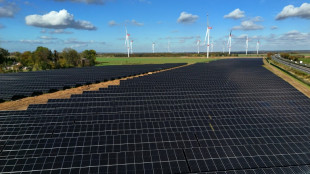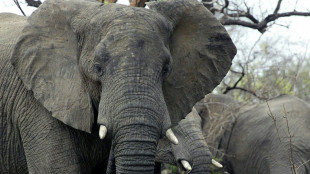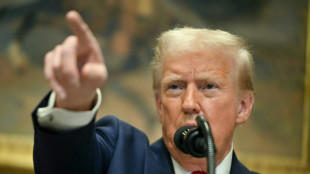
-
 Solar power surpasses coal in EU for first time
Solar power surpasses coal in EU for first time
-
Musk, Wikipedia founder in row over how to describe 'Nazi salute'

-
 Axel Rudakubana: troubled teen whose knife rampage shocked Britain
Axel Rudakubana: troubled teen whose knife rampage shocked Britain
-
Sasaki vows to 'give best' to fire-torn LA at Dodgers unveiling

-
 UK teen faces sentencing over murders that sparked riots
UK teen faces sentencing over murders that sparked riots
-
Larry Ellison, tech's original maverick, makes Trump era return

-
 Trump push to 'drill, baby, drill' may hit industry roadblock
Trump push to 'drill, baby, drill' may hit industry roadblock
-
Instagram courts TikTok stars during turbulent times

-
 Political crisis hits South Korea growth: central bank
Political crisis hits South Korea growth: central bank
-
Elephants are not people, US judges say

-
 Sinner aiming to be 'better, stronger' in Australian Open semi
Sinner aiming to be 'better, stronger' in Australian Open semi
-
Mass evacuations after explosive new fire erupts near Los Angeles

-
 Guardiola concedes Man City 'could not cope' with PSG as European hopes flicker
Guardiola concedes Man City 'could not cope' with PSG as European hopes flicker
-
PSG push Man City to brink with stunning Champions League comeback

-
 Arteta wants sunshine break as Arsenal move towards last 16
Arteta wants sunshine break as Arsenal move towards last 16
-
PSG comeback floors Man City as Arsenal near Champions League last 16

-
 Trump toughens crackdown on immigration and diversity
Trump toughens crackdown on immigration and diversity
-
Celtic make 'little bit of history' with Champions League progress

-
 As Trump declares 'Gulf of America,' US enters name wars
As Trump declares 'Gulf of America,' US enters name wars
-
Celtic make Champions League progress thanks to Young Boys own goal

-
 Trump's tariff threats are 'leverage,' says informal economic advisor
Trump's tariff threats are 'leverage,' says informal economic advisor
-
Trump halts refugee arrivals in crackdown

-
 Gangs could overrun Haiti capital if aid falls short: UN chief
Gangs could overrun Haiti capital if aid falls short: UN chief
-
PSG sink Man City with stunning Champions League comeback

-
 Leao sinks Girona and pushes Milan into Champions League top eight
Leao sinks Girona and pushes Milan into Champions League top eight
-
Feyenoord stun toothless Bayern in Champions League

-
 Arsenal on course for last 16 after beating Dinamo
Arsenal on course for last 16 after beating Dinamo
-
Real Madrid thrash Salzburg to get back on Champions League track

-
 Les Paul owned by guitar god Jeff Beck auctioned for over £1 mn
Les Paul owned by guitar god Jeff Beck auctioned for over £1 mn
-
Colombia moves to arrest guerrilla leaders behind wave of violence

-
 New explosive wildfire erupts near Los Angeles
New explosive wildfire erupts near Los Angeles
-
Valladolid say Man City tapped up young star

-
 Fear abounds as M23 fighters close in on DR Congo's Goma
Fear abounds as M23 fighters close in on DR Congo's Goma
-
Sabalenka, Swiatek eye final showdown at Australian Open

-
 Musk bashes Trump-backed AI mega project
Musk bashes Trump-backed AI mega project
-
Hundreds to wed as Thai same-sex marriage law comes into force

-
 Musk seeks Trump pardon for 'Bitcoin Jesus,' charged with fraud
Musk seeks Trump pardon for 'Bitcoin Jesus,' charged with fraud
-
Shakhtar deal blow to Brest's Champions League last-16 ambitions

-
 What would Trump tariffs mean for key trade partner Mexico?
What would Trump tariffs mean for key trade partner Mexico?
-
Does China control the Panama Canal, as Trump claims?

-
 Trump tells Putin to make Ukraine deal 'now' or face tougher sanctions
Trump tells Putin to make Ukraine deal 'now' or face tougher sanctions
-
Yemen's Huthis say freed detained ship's crew after Gaza truce

-
 Mel B, Trump and Milei: What happened at Davos Wednesday
Mel B, Trump and Milei: What happened at Davos Wednesday
-
Spain's Sabadell bank to move HQ back to Catalonia

-
 Wembanyama returns to Paris for NBA games as a global star
Wembanyama returns to Paris for NBA games as a global star
-
Fashion world 'afraid' of Trump, says Belgium's Van Beirendonck

-
 Besiktas romp to victory over Athletic in Solskjaer's first game
Besiktas romp to victory over Athletic in Solskjaer's first game
-
'Best feeling' as Hamilton drives first laps for Ferrari

-
 Argentina's Milei says would leave Mercosur for US trade deal
Argentina's Milei says would leave Mercosur for US trade deal
-
Musk slams Trump-backed AI mega project

| RBGPF | 0.26% | 62.36 | $ | |
| SCS | -1.9% | 11.58 | $ | |
| GSK | -1.05% | 33.43 | $ | |
| CMSD | -0.17% | 23.96 | $ | |
| NGG | -2.56% | 60.05 | $ | |
| VOD | -2.03% | 8.38 | $ | |
| RELX | -0.59% | 49.26 | $ | |
| BTI | -0.44% | 36.57 | $ | |
| CMSC | -0.26% | 23.49 | $ | |
| RIO | -1% | 61.12 | $ | |
| RYCEF | 2.02% | 7.42 | $ | |
| BCE | -1.04% | 23.15 | $ | |
| BCC | -0.94% | 127.92 | $ | |
| JRI | -0.32% | 12.53 | $ | |
| BP | -1.25% | 31.13 | $ | |
| AZN | 0.35% | 68.2 | $ |

Boric begins Chile presidency alongside student comrades
Former student leader Gabriel Boric will take on Chile's greatest challenge since the end of the Augusto Pinochet dictatorship when he is sworn in as the youngest president in his country's history on Friday.
It is a challenge he will tackle alongside fellow comrades-in-arms who stood beside him in a 2011 student movement that took on outgoing President Sebastian Pinera and exposed the deficiencies of a neoliberal economic model otherwise lauded for its success.
Boric's election emphasizes a generational shift in Chilean politics that began in 2017 with the emergence of the leftist Broad Front coalition, which he leads.
Mostly middle-aged male elites are being replaced by a younger majority-women cabinet: 14 out of 24 ministers that have an average age of just 42.
"Today a new chapter in our democratic history is starting to be written," Boric said in January when announcing his ministers.
"We are not starting from scratch, we know there is a history that lifts and inspires us."
His executive spokeswoman is Camila Vallejo, 33, and his minister in charge of relations with parliament is Giorgio Jackson, 35, both fellow student activist leaders in a movement that denounced the country's expensive and unfair education system and demanded social mobility for the poor.
For the first time a woman, Izkia Siches, 36, will head the interior ministry, while a former cleaner and trade unionist, 48-year-old Luz Vidal, is the new deputy minister for women and gender equality.
"Boric begins with a favorable climate in terms of public opinion thanks to the political capital he achieved in the election and with the naming of his cabinet," Marco Moreno, director of the economy, government and communications faculty at the Central University of Chile, told AFP.
"But he also arrives with very high expectations of what is to come."
- Economic slowdown -
The incoming government will have to work hard to earn the support of a parliament where the ruling coalition, which includes the century-old Communist Party, holds just 37 out of 120 seats in the lower house and five out of 50 in the upper house senate.
Even backing from the Socialist Party and other center-left collectives would not be enough support to achieve a simple majority in parliament.
One of the main issues during Boric's tenure will be a change to the constitution that dates from the 1973-90 rule of former dictator Pinochet.
A constitutional convention -- elected in a referendum last year -- is expected to finish rewriting the new magna carta this year.
The country Boric will lead is one of the most unequal in the world in which the top one percent own a quarter of the country's wealth, according to one UN agency.
That fact -- which was also exacerbated by the coronavirus pandemic -- was one of the main drivers behind the social uprising of 2019.
The sustained movement forced Pinera to increase tax spending and expand social programs, resulting in 2021 in the largest increase in public spending in the country's history at 33 percent.
- Responsible growth -
However, Boric inherits an economy in slowdown and inflation of over seven percent that is not expected to drop.
He must also deal with a 2022 budget that included a 22 percent cut in spending following the huge stimulus packages rolled out during the pandemic.
That will make it harder for him to deliver the European-style "welfare state" he promised on the campaign trail.
He knows it will take time to deliver on those promises.
"We must advance responsibly in the structural changes without leaving anyone behind, growing economically," he said in December after his victory was confirmed.
He must also try to quell the spiraling violence in the south where people from the indigenous Mapuche community are demanding a return of ancestral lands that are currently in the hands of forestry companies and private landowners.
And in the north he must tackle the problems created by opposition to a wave of mostly Venezuelan migrants arriving from the porous border with Bolivia.
F.Wilson--AT
